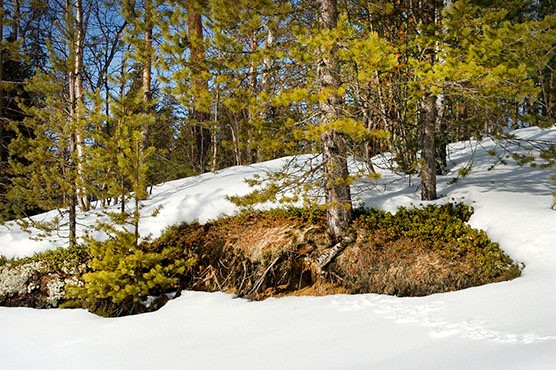Warming both beneficial and detrimental to forest ecosystem services
The rapid warming predicted for the northern boreal zone as well as intensive management practices may endanger the supply of the benefits produced by forests, i.e. ecosystem services. Recent IBC-Carbon projects estimate the changes in ecosystem services relating to the carbon cycle in the boreal and temperate zone forests using different modelling methods.
Carbon sinks in forests must be protected
A study led by researcher Anu Akujärvi (Finnish Environment Institute SYKE) made model-based estimates for many European areas and found that the biomass carbon stock will increase as much as 60 % by the end of the century compared to the 2005 level. The shorter the rotation length, however, the more the harvest residue removal decreases the soil carbon stock. The increase in growth caused by climate change will not compensate for the carbon emissions from the soil in the short-term scenario.
”The results indicate that in the short term it is vital to take care of the carbon sequestration capacity of forests in the changing climate. Intensive forest management and harvest residue removal combined with short rotation lengths of even under 50 years decrease the carbon sequestration capacity of forests despite the enhanced forest growth caused by the warming climate,” Akujärvi sums.

© Photo: Riku Lumiaro
The study lead by Akujärvi was conducted in co-operation with researchers from the International Institute for Applied Systems Analysis (IIASA). The group studies sustainable use of natural resources in order to safeguard ecosystem services in the changing climate. The published study is a part a doctoral dissertation project funded by the Maj and Tor Nessling Foundation.
Longer vegetation active period, weaker opportunities due to less frost
According to a research assessment compiled by senior research scientist Maria Holmberg (SYKE), climate change will have both beneficial and detrimental impacts on key boreal forest ecosystem services. The assessment is based on co-operation through the MONIMET project with researchers from the Department of Forest Sciences at the University of Helsinki, Natural Resources Institute Finland (Luke) and the Finnish Meteorological Institute (FMI).
As per the group’s results, in the future the forest soil dries more often in the summer and has less frost in the winter. Less frost can make it more difficult for forest machinery to move and can increase harvesting damages. The vegetation active period is projected to become approximately 30 days longer – spring will begin approximately three weeks earlier and autumn a week later than currently. The longer and warmer vegetation active period may offer more recreational possibilities but simultaneously increase the risk of damage by insects.
According to the model-based estimates, both the annual forest growth as well as the annual forest carbon sink may substantially increase from the reference period 1981–2010 to the end of the century. The estimates are based on the assumption that forests would be managed according to the current forest management recommendations and that the forest structure would not change. The possible increased risk of forest damages due to the warming climate or the effect of soil nutrients on forest growth could not be taken into consideration in the modelling, either. The growth and carbon sink predictions are maximum estimates that will not, in reality, be reached.
”Predicting the future based on the results is uncertain – rather, the study provides an idea of the potential change of forest ecosystem services in the changing climate,” Holmberg notes.
Both studies found that more research data is needed especially on the effects of climate change and forest management methods on the microbial activity and nutritional balance in the soil.
The research articles are freely available
- Akujärvi, A., Shvidenko, A., Pietsch, S.A. 2019. Modelling the impacts of intensifying forest management on carbon budget across a long latitudinal gradient in Europe. Environmental Research Letters 14: 3.
- Holmberg, M., Aalto, T., Akujärvi, A., Arslan, A.N., Bergström, I., Böttcher, K., Lahtinen, I., Mäkelä, A., Markkanen, T., Minunno, F., Peltoniemi, M., Rankinen, K., Vihervaara, P., Forsius, M., 2019. Ecosystem Services Related to Carbon Cycling – Modeling Present and Future Impacts in Boreal Forests. Frontiers in Plant Science 10: 343.
For further information, please contact
- Senior Research Scientist Maria Holmberg, Finnish Environment Institute (SYKE), firstname.lastname@ymparisto.fi, tel. +358 295 251 181
- Researcher Anu Akujärvi, Finnish Environment Institute, firstname.lastname@ymparisto.fi, tel. +358 295 251 061